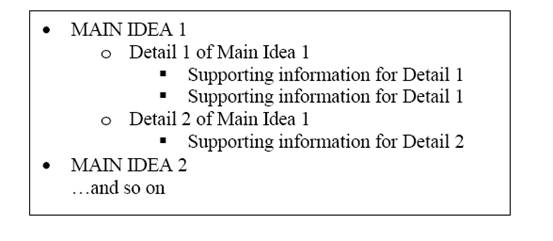Listening strategy: Note Taking
Taking notes effectively is crucial to success in academic and professional environments. There are four important components to successful note taking.
1. Language. Take notes in the language in which you will need to use the notes. That is, if you are in a business meeting in New York with U.S. companies and you will need to use
your notes to write memos, letters, or contracts in English, then take notes in English, not in your native language. Similarly, if you are in a class where you will be tested in English or you will need to discuss the information in English, take notes in English. This will help you remember precise language and context in note-taking situations. In addition, it will help develop your English skills. Finally, and most importantly, after you have become an efficient note taker in English, you will be able to take notes more quickly and accurately than if you constantly translated everything.
2. Speed. Effective note taking requires that you record information quickly. To do this, good note takers DO NOT WRITE DOWN EVERY WORD or try to take notes in neat sentences; instead, they write only key words and phrases. In addition, good note takers use shorthand when they take notes. In other words, they use symbols to represent words or ideas. Here are some common examples:
> is more than w/ with
< is less than w/o without
= is equal to b/c because
≈ is approximately equal to K thousand (40K = 40,000)
≠ isn.t equal to / per, out of (1/25 = 1 per 25)
Δ to change to, a change +, & and
→ leading to, causing ∴ therefore, consequently
← to be caused by, as a result of ♂ man, men
↑ to go up, increases ♀ woman, women
↓ to go down i.e. for example
@ each, at
When you take notes, try using some of these symbols as well as any others you can think of.
Everyone has a different system of note-taking shorthand, so feel free to be creative!
Here is an example of efficient note taking which reflects a short passage from Lecture 5.
Notice that ideas have been reduced to key words and that shorthand symbols are used extensively.
You hear:
Slavery was a major institution in both the Greek and the Roman worlds. In classical Athens –the fifth and the fourth centuries B.C. – probably about a quarter or a third of the total population is slaves brought in from outside the community to work for individual slave owners. And that population, proportion …that’s roughly comparable with what you get in the U.S. South in the beginning of the nineteenth century. About a quarter or maybe a third of the population in some areas are slaves. So slavery is essential fact of life in the ancient worlds.
You write:
slavery = maj. instit. in Grk, Roman worlds
- classical Athens . 5th-4th C’s B.C. . ¼ - ⅓ pop. = imported slaves
≈ slave % in U.S. South - early 19th C.
∴ slavery = essential pt of life in anc. worlds
3. Organization. Your notes should reflect which of the lecturer.s points are main points and which are details. Sometimes the details are also broken down into smaller categories or subdetails, and your notes must show this as well.
There are many effective ways to represent lecture organization in your notes. One common technique is to write the main ideas close to the left margin of the page, the details below the main ideas and a little bit to the right, smaller details below and to the right of the larger ones, and so on.

If this system of note taking doesn’t suit you, ask your teacher for other suggestions.
A final note: Clear, organized note taking requires practice. Furthermore, your opportunities for practice don.t have to end when the lecture ends: the best note takers often rewrite their notes to show the ideas and organization more clearly.
4. Accuracy. Are your facts correct? Did you write down all the main points and a sufficient number of details? Can you read your notes and understand what you wrote? These skills take time and practice, but you can achieve a lot of success through good pre-listening preparation (see Listening Topic 1), efficient note taking using shorthand, and a clear pattern of organization.
In addition, accurate note taking requires stamina. That is, you must be able to concentrate for long periods of time. The more you practice, the more your note-taking stamina will develop.
Finally, there will be times when you miss information. Don’t worry . this happens to all of us! If you do miss information, make a guess about what you missed and try to maintain your focus.
Finally, there will be times when you miss information. Don’t worry . this happens to all of us! If you do miss information, make a guess about what you missed and try to maintain your focus.
Fortunately, lecturers often repeat important information, so if you miss something, there.s a good chance you will hear it again.